Allison Magnuson, M.D.; Sindhu Kadambi, M.D., M.S.; Jodi Lipoff, M.D.
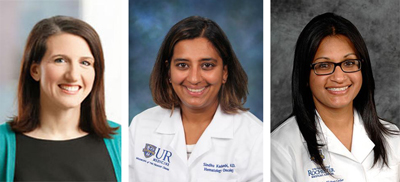
Allison Magnuson, DO, Sindhu Kadambi, MD, MS, Jodi Lipof, MD
Division: Hematology/Oncology
Hometown: Magnuson – Liverpool, NY, Kadambi – Princeton, NJ, Lipof – San Francisco, CA
What inspires you to serve as a DEI champion for your division?
We feel passionate about having our cancer workforce reflect the demographics of the patients we care for; a key component to this is fostering trainee and career development as well as nurturing an inclusive and supportive environment for individuals from all backgrounds to be able to thrive.
What DEI changes would you like to see in your division in the next 3 years
Increasing participation of Wilmot faculty in DEI activities, and a greater emphasis on experiential activities and community engagement for our faculty to participate in.
What is one DEI accomplishment that makes you proud?
We have tried to be strategic and align DEI activities with areas of focus for the Wilmot Cancer Institute. For example, previously, we organized a large-scale training with the Office of Equity and Engagement about best practices in caring for our sexual and gender minority patients, which aligned with the roll out of SOGI data collection during that time period. (SOGI=Sexual Orientation and Gender Identity.) At present, clinical trial accrual is a major emphasis at Wilmot and we have developed a three-part series for faculty and staff in the clinical trials office with a national leader on diversity in clinical trials which will occur this spring.
Do you have any pets?
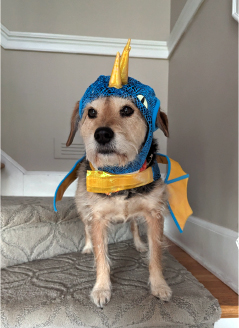
A pet dragon resides in the Kadambi household
(otherwise known as Roxie)
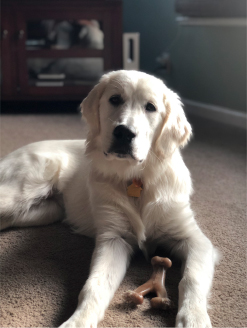
Cadi Magnuson enjoys long walks, failed attempts to chase squirrels, and eating any dropped food morsels from the 3 Magnuson boys
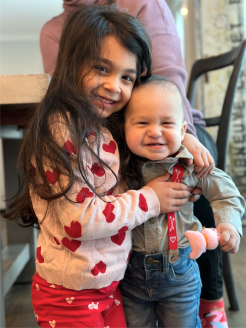
Although there are no four legged members of the Lipof family, there are several other energetic creatures in the household!
TramAnh Phan, M.D.
What inspires you to serve as a DEI champion for your division?
As a DEI champion within our Nephrology Division, my inspiration stems from personal and professional experiences. The challenges kidney patients face, particularly those hindered by limited resources, have profoundly touched me. It motivates me to work towards more equitable health care access and support systems. In addition, my own path, as a first-generation Vietnamese American navigating the complexities and challenges of medical training in the U.S., has been incredibly enlightening. It underscored the importance of inclusivity and support for individuals from diverse backgrounds in the medical field. These experiences have instilled in me a deep commitment to cultivating an environment where diversity is not only recognized but also sincerely celebrated. I would like to promote an inclusive culture in our division, where every individual, irrespective of their background, is appreciated and feels empowered. I firmly believe that embracing diverse perspectives is not just beneficial, but essential. It can significantly enhance our professional landscape and, importantly, improve patient care.
What DEI changes would you like to see in your division in the next 3 years
I envision significant growth in our division's commitment to diversity, equity, and inclusion. It is anchored in several key developmental areas. Firstly, I wish to see our community outreach initiatives flourish. Building on our strong relationship with the local chapter of the National Kidney Foundation, we aim to broaden our connections with more local organizations and primary care physicians. This expansion will have a meaningful impact on preventive care, particularly in underrepresented communities, where improved access to health education and resources can be transformative. Another major priority of our division is to increase access to comprehensive kidney care and chronic kidney education programs. Empowering patients with the knowledge and resources to actively participate in their kidney care is critical. Our division is committed to expanding these programs, including offering in-person classes in Spanish, to meet diverse patient needs. We are also increasing the number of kidney transplants and other efforts to increase access to home dialysis. While these goals are ambitious, our division's dedication and collaborative spirit make them achievable. With our ongoing initiatives and strong teamwork, these goals are within our division's reach.
What DEI strength do you see within your division?
Our division's approach to DEI is uniquely strengthened by our supportive leadership, dedicated faculty, collaborative spirit, and creative commitment of our colleagues. I am particularly proud of our leaders' steadfast support and dedication. The commitment is not just in words but in meaningful action and substantial investment in our initiatives. It creates a solid foundation that allows all of us to strive towards these goals. Moreover, many of our patients face complex medical issues, and come from underrepresented backgrounds with limited resources. This reality has naturally steered our efforts towards addressing the challenges of limited resource access and healthcare disparities. Our faculty, comprised of genuinely caring physicians, are passionately committed to improving patient outcomes against their challenges. Their compassion is integral in meeting the unique needs of our patients. Collaboration is another key strength within our team. I find it incredibly rewarding to work alongside fun and supportive colleagues, who are exceptionally creative and committed to DEI efforts. This collaborative environment enriches our workplace and significantly bolsters our capacity to make meaningful DEI advancements.
Do you have any pets?
Our living room has 75-gallon, 30-gallon, 20-gallon, and 10-gallon fish tanks. We love watching them interact with each other. Occasionally, my husband would give a time-out to a bully individual, though I am unsure if isolating it in a net for about 3 minutes would make a huge long-term difference in a bully fish. A stray cat, Commander, also adopts us as their humans.
Paul Vermilion M.D. and Chay Webb
What inspires you to serve as DEI champions for your division?
We are firm believers that we are all more alike than we are different. Being a DEI Champion allows us the opportunity to help people identify the similarities. We are then able to help facilitate the conversations that encourage people to use these commonalities as a conduit for connecting with one another.
What DEI changes would you like to see in your division in the next 3 years?
We would like to see more members of our team begin actively working in the DEI space. It would be great to have even more DEI Champions on our team!
What DEI strength do you see within your division?
In the division of Palliative Care, we are very intentional about DEI. We try to ensure that we view everything through a DEI lens. We take a proactive approach to DEI, instead of just being reactionary. We initiate difficult conversations and embrace sensitive subject matter.
Tell us a fun fact about yourselves?
Paul: I once was taken to the hospital by helicopter after falling from a ski lift.
Chay: I lived in a different country for a while!
Steven Scofield, M.D.
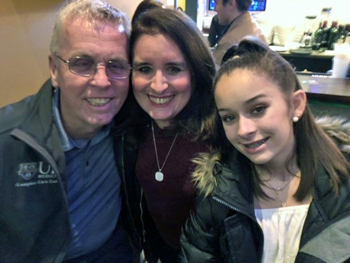
Steven Scofield, MD with his wife, Lourdes, and daughter, Allison
Division: General Medicine – Complex Care
Home Town: Miller Place, a hamlet of Long Island, New York
What inspires you to serve as a DEI champion for your division?
I am proud about the work we do in our division, caring for patients who have had challenging experiences with the health care system. I am particularly inspired by the efforts our division is putting towards caring for persons with sickle cell disease – a group of patients who traditionally have been affected significantly by the effects of systemic racism.
What DEI strength do you see within your division?
We are committed to the continued development of a comprehensive sickle cell program which addresses barriers to care, including access to expert care, education and provider attitudes, and important social determinants of health.
In what DEI areas could your division continue to grow?
Within our division, we are fortunate to have great diversity among our dedicated support staff, bringing their unique perspectives and strengths to the table. We could extend our focus towards enhancing the diversity of our medical providers as well, to ensure we serve the diverse array of people who trust us with their care.
What are your hobbies?
I am an avid golfer, and I just became a cat owner for the first time about a year ago.
Marilyn Augustine, M.D.
What inspires you to serve as a DEI champion for your division?
I’m glad to have an opportunity to do my part to create a more equitable world.
We spend so much of our time at work, collaborating with others. In my experience, the most successful, enjoyable, and impactful work is done when each team member feels that their voice is heard and their uniqueness is valued. However, this can be more of an aspiration than actuality. One thing that keeps me inspired to do this work is the belief that when we each feel as though we belong, we have more to contribute.
As an educator, I also seek to inspire and develop the next generation. No single person has all the answers. This work will take time, and we’ll make mistakes along the way. However, I have a lot of hope for the future. I believe that we can make progress when we work together, particularly if we are able to create a community in which we welcome sharing different experiences and perspectives.
What DEI changes would you like to see in your division in the next 3 years?
Currently in our division, we work mostly with individuals to improve diabetes care and nutrition. Unfortunately, in the current healthcare system, not all individuals have equal access to care. I would like to see our division participate in more community partnerships, as I think this is one way we can systematically address some of the existing inequities in health outcomes.
What DEI strength do you see within your division?
Our shared values of diversity, health equity, and inclusion are a strength in our division. My colleagues each incorporate these principles depending on their strengths and passions. For example, in close collaboration with the Medicine-in-Psychiatry team, Susanne Miedlich, MD, has been assisting people with serious mental health illness and diabetes to take control of their cardiometabolic health. Olga Astapova, MD, PhD, teaches our fellows in respectful and compassionate gender-affirming care for gender diverse people in our transgender clinic. Sara MacLeod, DO, MPH, has been hard at work advocating for affordable prices of diabetes medications. Many of my colleagues are invested in providing excellent education for students, residents, and fellows, and they are working to incorporate DEI themes into educational materials and to encourage more diversity in the training pipeline. With all of the above, we inspire, teach and encourage each other to live up to our shared values.
What are your hobbies?
I’ve played the violin since I was four, and I still play regularly, mostly Western classical music. After listening to more bluegrass and watching the movie "Throw Down Your Heart", I decided to start playing the banjo. I love how it changes the sound of the group when I play with my family, and it has been exciting and challenging to learn to hear and play music in a different way.
Emily Salib, M.D.
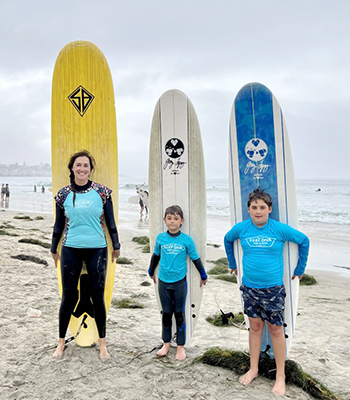
Emily Salib, M.D.
(pictured, left, with her family)
Division: Highland Hospital
Home Town: Waterbury, VT (home of Ben & Jerry’s!)
What inspires you to serve as a DEI champion for your division?
To me, DEI work is work that we should all be doing every day because we know that inequity exists in every corner of our society. It is also abundantly clear that improving equity, access, and inclusion for our patients, learners, and colleagues benefits everyone. A part of me though feels we shouldn't have to justify this work by saying "it will benefit all" because at the end of the day, working toward a more just and equitable culture and society for those who have been repeatedly marginalized and minoritized is just the right thing to do.
While DEI work certainly means projects, initiatives, policy change, and advocacy, for healthcare providers, educators, and researchers, DEI work can also mean smaller, intentional, and individual action. It can mean listening to a lecture or reading an article to gain more insight into our own biases or assumptions. It can mean asking a learner or a colleague how they are doing or supporting someone's idea who may have a quieter voice in a meeting. Maybe it's leaning your chair closer rather than pulling away in a tense patient interaction, or maybe it's choosing not to include certain, unnecessary patient identifiers or history in your clinical documentation.
I love doing DEI work at Highland because of the people. We have a small working group of hospitalists, geriatricians, palliative care physicians, and APPs. We meet regularly to check in, develop ideas for new initiatives, and work on projects. Being part of a smaller division means it's fairly easy to roll out initiatives. For example, we developed a tool to help review RCAs from an equity standpoint. Within a few days of developing the tool, we were up and running and implementing it across the hospital. We have very supportive leadership who are excited to help facilitate new projects and lend all the assistance they can to help us achieve our goals.
What DEI changes would you like to see in your division in the next 3 years?
As a hospital-based division of mostly inpatient providers, we don't have as many links to the local community as some outpatient practices may have. I would love to see our division develop more community engagement, collaboration, and connection with the local neighborhood communities that Highland serves.
What is one DEI accomplishment that makes you proud?
We are working on optimizing the patient experience for people with sickle cell disease who are admitted to Highland Hospital. The director of Social Work, Sally Rousseau LCSW, LMFT, was awarded a HEPSO grant to fund a full-time Integrated Medical Family Therapist to support this patient population. One of the goals for this position is to develop training, coaching and support for inpatient staff and providers to use a trauma-informed, biopsychosocial framework in caring for patients with sickle cell disease. I think this is a really exciting and innovative approach to provide compassionate and more patient-centered care for this population.
What are your hobbies?
I love being outside with my family. I grew up downhill and cross-country skiing, swimming, running and hiking. Now I love to share these activities with my kids. A few weeks ago, I took a surfing class with my nine and six-year-old boys in San Diego. It was a little scary but really fun. Turns out that surfing is a killer triceps work-out. I couldn't move my arms the next day.
Melissa Mroz, M.D., M.P.H.
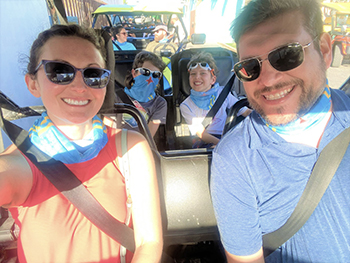
Melissa Mroz, MD, MPH
(pictured, left, with her family)
Division: General Medicine - Ambulatory
Home Town: Geneva, NY
What inspires you to serve as a DEI champion for your division?
Diverse teams are stronger and can only reach their full potential when they include identities that represent the community. Our systems and the culture of our institution aren't currently achieving this, and it is not OK.
As a white, cis-gender woman physician, I have had personal experience with gender discrimination and also recognize I have the privilege to speak up and advocate for others. I recall an attending in medical school stating he would never hire a woman physician with kids full-time because her place was at home. This statement made me so angry and caused me to question my choice in career. I pursued that career and made a professional goal to help support others to pursue their paths.
I became interested in other people's experiences and started conversations about bias and discrimination with learners and colleagues of different races, ethnicities, sexual orientation, and religion. Looking at our systems through a new lens has helped find areas where we can do better.
I do not do this work in isolation. I am inspired by the multidisciplinary team members in our division who have fantastic ideas on how to promote health equity. They each bring unique knowledge and make our practice a better place. I want to create a space where they always feel heard and valued.
What DEI changes would you like to see in your division in the next 3 years?
We need more diversity at the faculty and leadership level. I hope this can be achieved through mentorship and sponsorship in addition to supporting a culture that helps people of all identities thrive in their chosen career path. I would also like to see continued support and expansion of community partnerships, like the Medical Legal Partnership with Law NY.
What DEI strength do you see within your division.
The strength of our division is the people and their commitment to health equity. For example, Mahala Schlagman, MD, has led the Medical Legal Partnership as well as developed curriculum for our Internal Medicine Residency Program. All of our faculty and staff have participated in cultural humility training with the Office of Equity and Inclusion. We share a commitment to helping patients navigate the complex and ever-changing healthcare system. As a safety net primary care practice, we provide care for many folks who have faced inequity. From this work, we gain insight into the hardships that many people face and can advocate for change.
Do you have any pets?
I have two rescue dogs who have taught me much about the value of patience, persistence, and positive reinforcement. Summer is a four-year-old Irish Setter mix who is full of energy, loves kids, and thinks she is a 65-pound lap dog. Roe is a two-year-old Husky-German Shepherd mix who is very fearful of new people but very smart and so sweet with our family.
Jeffrey Alexis, M.D.
What inspires you to serve as a DEI champion for your division?
Diversity, Equity, & Inclusion have been important to me throughout my medical career. This is driven to a large degree by me wanting to see more people who look like me in medicine. When I applied for medical school, the number of Black students at the school was a major factor in deciding whether I would apply to a particular school. Increasing the number of underrepresented in Medicine students and physicians is important for several reasons. One is that outcomes in Black patients are better when the patients are cared for by Black physicians. Simply put, we need more Black physicians. In addition, a welcoming environment with other underrepresented in Medicine students/faculty helps other underrepresented in Medicine folks to succeed—it certainly did for me. I think that a diverse environment creates a better learning environment as we all learn from each other.
What DEI changes would you like to see in your division in the next 3 years?
We need greater diversity in our fellowship programs and in our faculty. Cardiology does very poorly in recruiting women and in recruiting those underrepresented in Medicine. Closely related to increasing diversity is improved retention of faculty which is an area where we have struggled. We also need to better understand disparities in outcomes in our patients. This includes looking at who goes for procedures such as cardiac catheterization, defibrillator implant, left ventricular assist device and transplant, and which patients do not undergo these procedures.
What DEI strength do you see within your division.
We do have core faculty who are committed to DEI efforts. We have had good discussions since the recent Supreme Court Decision on affirmative action, discussing what we can do to improve diversity in Cardiology. Erica Miller, MD, has truly been superb including her work developing a Health Equity and Quality Improvement Curriculum for our fellows.
Tell us one fun fact about yourself.
My aunt is responsible for Barack Obama and Michelle Obama meeting. My aunt, a lawyer, interviewed law student Barack Obama for a position at her law firm. The firm typically did not hire law school students but she assured them this was no typical student. Michelle Robinson worked at the firm and that is how they met.
Ciandra D'Souza, MD, MPH and Ida Earner, NP
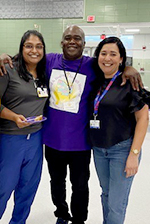
Ciandra D'Souza, MD, MPH and Ida Earner, NP
(pictured with Clay Harris, founder of "Uniting and Healing Through Hope of Monroe County")
Division: Geriatrics & Aging and the UR Aging Institute
Home Towns:
Ciandra – Goa, India
Ida – Rochester, NY
What inspires you to serve as a DEI champion for your division?
Ciandra: Growing up in India and the middle east, moving to the United States when I was 18, showed me a different view on culture and lifestyle here. Being a part of a minority community, and having experienced health care access issues and other stereotypes has only inspired me to fight harder to ensure that there is equality across all communities.
Ida: My personal experiences drive my commitment to serve as DEI champion for the Division of Geriatrics. I grew up in poverty, part of a large Mexican family in the inner city of Rochester with parents who were non-English speaking and worked as migrant workers. We had limited access to healthcare due to numerous socially-determined circumstances, including a language barrier, poverty, and lack of transportation. My father’s health outcomes were adversely impacted by the unfair and frequent mischaracterization of him as being a “non-compliant,” chronically ill patient. My mother, at times, was described as “difficult” when in fact, they simply fell victim to the systemic oppression of a health care system that failed to create multicultural and multilingual partnerships with their patients. Now, in my role as DEI champion, I have been able to connect and partner with several community organizations in support of addressing similar health inequities, with a focus on older adults, including within Spanish-speaking communities
What DEI changes would you like to see in your division in the next 3 years?
Ciandra: I hope to see leadership and administration support this DEI group and the efforts being put forth by our members.
Ida: Within the next 3 years, I hope to see ongoing expansion of the number of partnerships formed between the Division of Geriatrics and communities both locally as well as in other counties. I hope for mandatory DEI education for all health care professionals in the division, as a standard of new-hire orientation, and routine education.
What is one DEI accomplishment that makes you proud?
Ciandra: All the wonderful events that I have been able to participate in with my co-chair, Ida.
Ida: I agree!
Tell us one fun fact about yourself.
Ciandra: I never had a pretzel or corn dog in my life till I moved to the USA, didn’t even know what they were!
Ida: I still love hopscotch! I always jump along any hopscotch board I find and will sometimes draw hopscotch games with chalk, out in public, just to see if I can tempt others to walk by without hopping!
Jessica Stern, MD, MS
What inspires you to serve as a DEI champion for your division?
This quote by Bryan Stevenson sums up well what inspires me in my role as a DEI champion:
When people get proximate to the problems and the things they care most deeply about, not only does it help them do better work, and be better problem solvers—it changes them…We all have to get closer to the problems that burden us.”
I entered the medical field with a goal of centering diversity and equity in the spheres that I inhabit. I think this stems from the fact I grew up in a diverse family of immigrants of all sizes, shapes, shades, and educational backgrounds. This impacted my world view and I’ve experienced first-hand how equity in access to health care affects outcomes. The fields of allergy, immunology, and rheumatology have been pillars in scientific advancement, understanding of pathophysiology, and sophisticated drug development, yet outcomes for our most historically marginalized patients continues to be poor. I am motivated to change these outcomes and inspire others to do so as well.
What DEI changes would you like to see in your division in the next 3 years?
I would like to see that we continue to center equity in all of our endeavors including location expansion, recruitment and retention of diverse staff, faculty, and learners, and increased engagement from the entire division. Often the DEI space is relegated to a few lectures, or an afterthought/addition to plans in research, educational curriculum, and hiring practices. To move the needle in any of these spaces we all need to work together to prioritize DEI in all that we do.
What DEI strength do you see in your division?
I’d like to highlight the work of Allen Anandarajah, MBBS, Ummara Shah, MD, and Shadefai Goldsmith, NP, in continuing to strive for excellence in their RA-CHAMP and IQ-LUPUS programs. This work centers on self-efficacy and social support in patients with RA and Lupus. These are programs that we hope to emulate in other patient populations in allergy, immunology, and rheumatology.
Tell us a fun fact about yourself.
I like to tell people I am the mother of three dragons (Sydney, Sebastian, and Maité), and my partner is a public defender. Dinner conversations often center on justice, such as how to equitably decide who gets to make the selection for movie night.
Julia Trumbo, MD
What inspires you to serve as a DEI champion for your division?
Coordinating the faculty component of the White Coats for Black Lives demonstration at URMC after the murder of George Floyd with my Hospital Medicine division partners, Drs. Clare Park and Allison Panzer. I realized our medical center community was eager to stand in solidarity against racism and inequity. But afterwards, we wondered, what next? How do we propel forward from a demonstration to action? In the time since, I have seen a big shift in how the institution views the importance of DEI efforts. There is an ever-expanding network of people engaged in this work and getting support for their time. I also have found that students, residents, and faculty are very engaged in wanting to learn, which injects energy and generates momentum for the improvements we are continuing to make in this space.
What DEI changes would you like to see in your division in the next 3 years?
I think a high priority area in the coming years will be to continue to work on our diversity in the recruitment and retention realms. Since we have hired many graduates from our internal medicine and internal medicine-pediatrics residency programs, working on providing specific support for minoritized residents and students within that pipeline will be of the utmost importance as well.
What DEI strength do you see within your division?
My division chief, Dr. Justin Hopkin, approached my partner, Dr. Osman Jilani, and me, and encouraged us to form a committee to think through how to approach DEI in our division and gave us the support and room we needed to innovate. Our IDEA (Inclusion, Diversity, Equity, Advocacy) committee has evolved to include my new co-lead, Dr. Catie Glatz, and 13 other members, all of whom are actively working on projects involving DEI on multiple levels—mentorship, medical education, faculty development, climate and culture, and research. Our diversity is truly our strength in our work, with members offering to work within their strengths to weave DEI initiatives into their career development.
What are your hobbies?
I am an avid reader, reading about 1 book a week, and a voracious consumer of true crime murder podcasts!